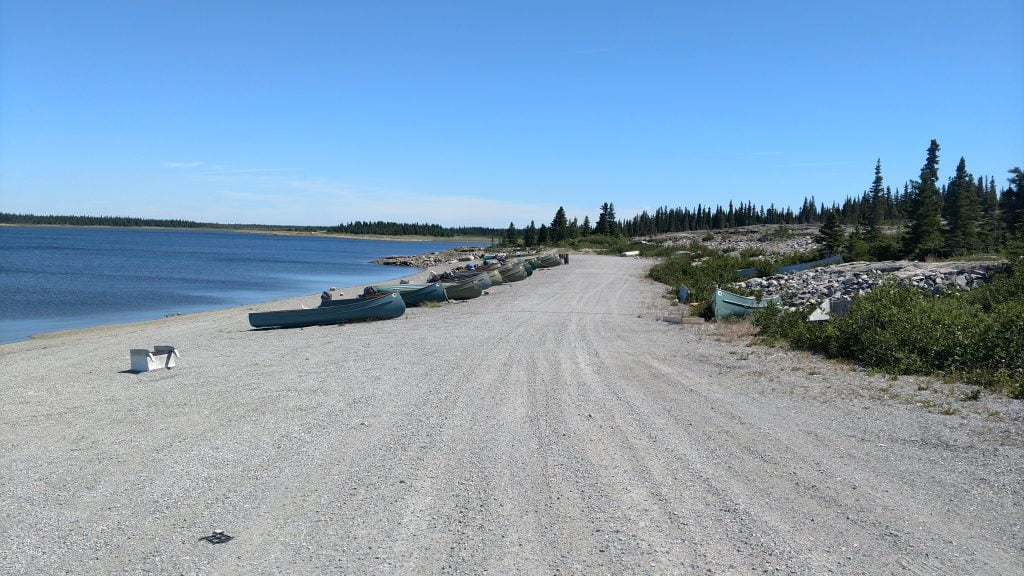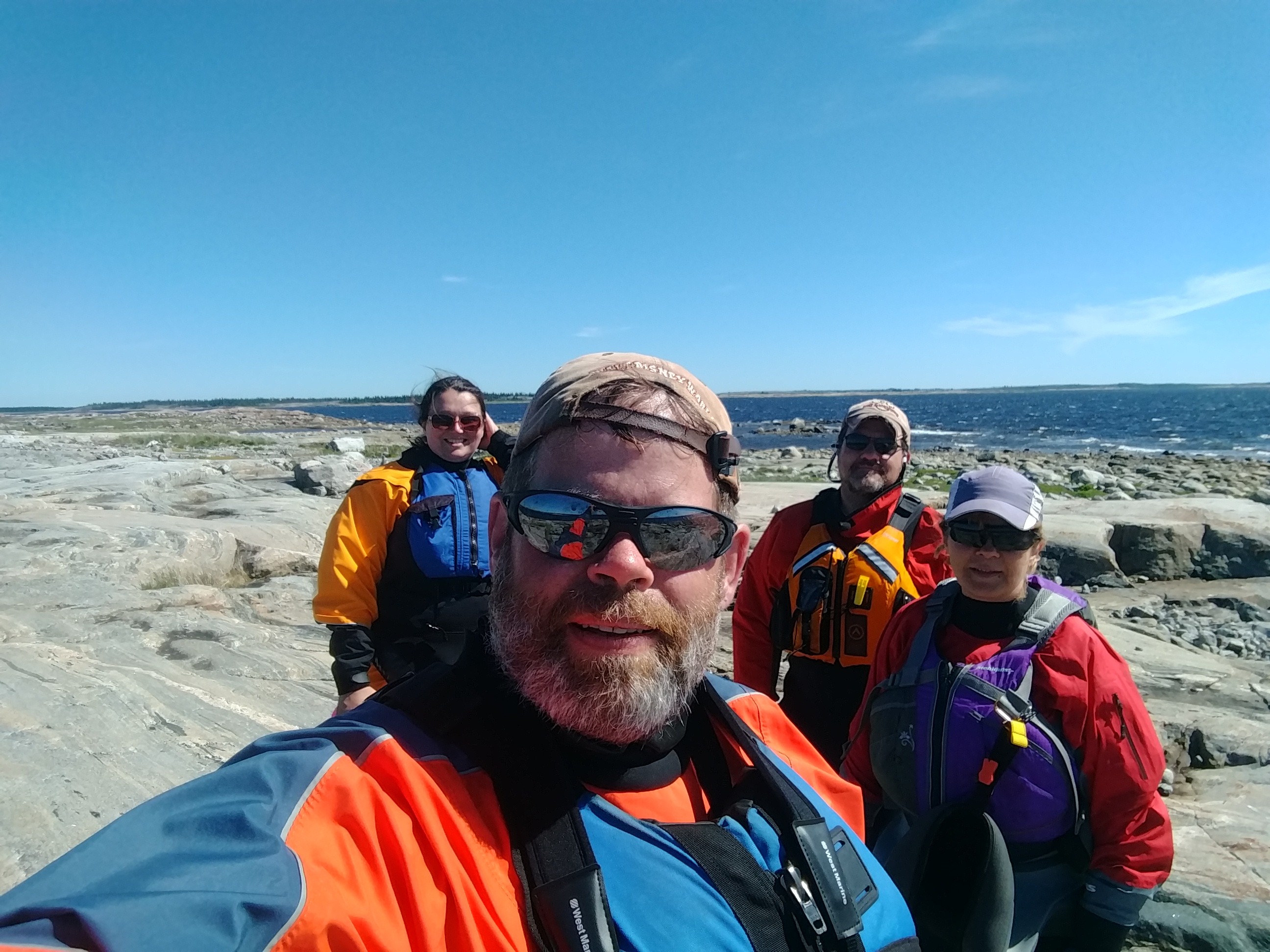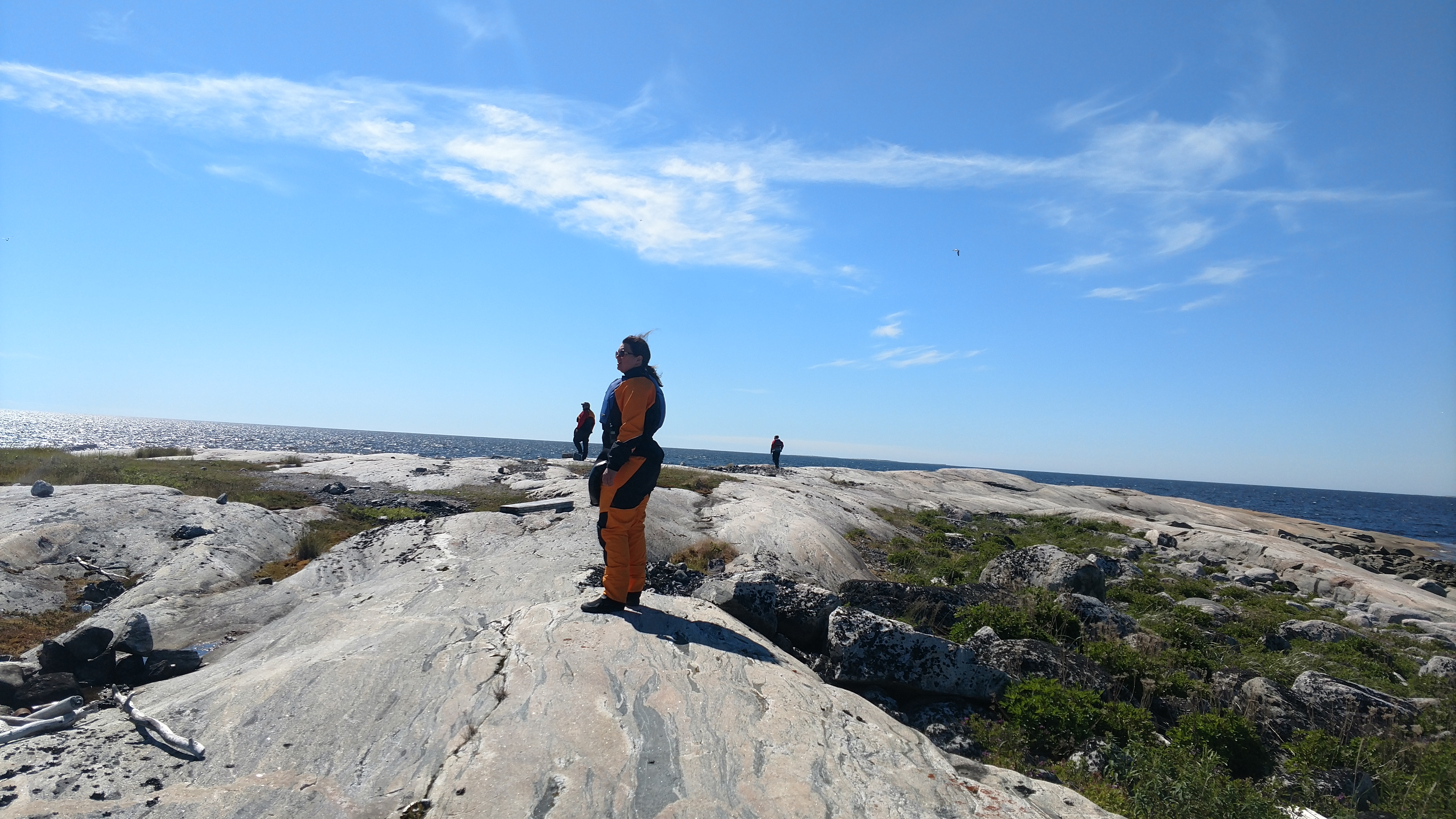We had just arrived at Longue Pointe, the northern terminus of any road in eastern North America. The point serves as a launch for hunting and fishing parties of the nearby villages.
As we maneuvered our vehicles into our makeshift campsites overlooking the water, the low thrum of an engine slowly coated the silence. The gentle “pop” and “crackle” of gravel grew louder. A vehicle was approaching from around a bend just above us. It was moving slow. This always seems to happen just as we set up camp. We haven’t seen anyone for hours, but as soon as we start pitching camp, someone shows up.

The truck creeped around the bend on top of the hill and slowed. I could see a grey haired man driving and the outline of a passenger wearing a ball cap. They kept their windows closed, I raised a hand to say high and approached the side of the road. The windows stayed up and the truck took its time to come to a stop. Then the figure inside raised his hand and the window lowered. . . “How” he said.
I grimaced. . . “That’s not what I said”. He said, “You always say ‘how’ when you meet Indians.” I looked dumbfounded at the grey haired man. Next to him, I saw a few teeth displaying an amused smile. They burst into laughter. I could only produce (what was probably) a crooked smile and a raised eyebrow.
The less than toothy passenger said, “The most important question is. . . did you vote for Trump?” These guys were good. I quickly scanned their faces, looking for something, anything that would tell me their plan. Then I retorted, “Whose Trump?”.
A somber silence fell over us and my counterparts’ expression turned very serious. He said, “Wrong answer.” Pointing to the grey haired driver, he said, “He is the only guy in the village with a Trump coffee mug”. The driver gazed out the windshield into the distance. He looked to be fighting back a smile.
I was at a loss. I wasn’t sure where to go with this. These were some old order pranksters who seemed very practiced at trolling for unsuspecting white people to make fun of. The standard issue Trump response in this country was to roll your eyes and chuckle at the mention of our newly elected POTUS. That response, clearly, wasn’t going to work with these masters of banter.
“Does anybody know you have . . . a Trump Mug?”, I asked, trying to buy time.

This was a rare moment for me. I had no smart aleck, sarcastic or downright nasty response. These guys were playing on a level I hadn’t seen since the coffee shop days of my rural hometown in Michigan. I was sure we weren’t being serious, but this parlay was educated and unsettling. We haven’t even said “hello” yet.
Then, the driver pushed his door open. He stepped out with an expression of near anger. He took a moment to survey the campsite then leveled his glare at me. His seriousness was palpable. He was about to tell me something extremely prophetic and he took the time to let me know.
He said, “You need to understand something right now. . . we outnumber you 4,000 . . . “ He counted our team, which was busy setting up camp, “. . .to 9. So you need to watch your step.”
Now I had him. I produced a big smile. And with the most polite, sociopathic voice I could muster, I said, “There are actually 10 of us. The one you can’t see has a 12 gauge pointed at your Trump Mug. . . waiting my signal. It’s your move.”
His friend broke first, bending over with laughter clutching his cane. His hat almost fell off. The man in front of me produced a big smile and said, “I’m George. . . with white hair” and thrust his arm out for a handshake. I grabbed his hand and we both chuckled.
“White Hair?”, I inquired.
“I’m the only bastard of my people who has white hair?”, he responded.
“You sure you don’t have some English in you?”, I asked. He raised an eyebrow, looked at me sideways and said, “that’s probably it.”
I was starting to realize that this type of teasing was a complicated cultural formality in this part of the world. It was how we would make friends. It reminded me of the 1970s & 80s rural traditions of my home country. This type of good natured teasing is often taken too seriously in the modern United States. This form of joshing is often considered offensive, racist or any variation of critical analysis. It just doesn’t fit with an uptight, self centered society. It was refreshing and, honestly, an excellent way to remove boundaries between cultures through making light of our differences and effacing them. Take note America, stop feeling sorry for yourself and start making friends again. It works.
By now, a few of our team were gathering around us. “George”, I said with sudden seriousness, “Do you know how we could get permission to camp here.” He struggled earnestly to think of someone we could ask. Then he suggested a phone number and seemed surprised that we couldn’t get a cell signal. Then, Nelson asked, “Why the hell do you want to camp ‘here’?” A game of “why” and “why not” ensued. Finally, I mentioned our goal of Cape Jones.
The mention of Cape Jones made George and Nelson take pause. “Really?!?”, George said. “Yep”, I explained, “My dad worked at radar sites in the 50s, 60s and 70s. “Really?!?”, he said again. This took the conversation in many directions – Cape Jones, flying helicopters to his camp halfway up the coast, the Caribou Migration, wildlife, stories, tales, and more. They made a passing suggestion of asking the “Snowboy” family. This was the first mention of the “Snowboy” family. Cape Jones was their family hunting ground and trap line. But, the conversation kept going.
The next hour was spent talking about the land, the people, “Professor Short”, Eel Grass, the disappearing goose population, wildlife stories and holding the Hydro Quebec organization accountable for the environmental changes that have plagued the area since the installation of the La Grande River hydro project.
George was more business-like than his colleague, Nelson. Nelson supported himself with a cane and a happy disposition. Occasionally, he would clarify something George would say, knowing we didn’t quite understand the logic or purpose of George’s many statements. He would occasionally add some banter or question someone on our team. These guys were engaging to talk to.
George would prove to be quite scholarly and serious. He was a man on a mission and a man that worked with a lot of “white folks”. In particular, his work with a Professor Fredrick Short from the University of New Hampshire was quite interesting. Dr. Short is an expert in seagrass and the founder of “Seagrassnet” a global monitoring program. George chatted about the loss of “eelgrass” in James Bay and the steep cost of working with an expert like Professor Short. Eelgrass is a generic name for many plants that grow in coastal beds. The coast we were standing on was curiously void of any shoreline plants and we were about to find out why.
George’s claim that the eelgrass had mostly disappeared from the Chisasibi coast confirmed the conversation with Robert from the day before. Also, the loss of the plant has seemingly corresponded with a decline in the goose population, a main staple of the Cree people. George contends that the increased discharge, due to dam diversions on the La Grande River, have caused the ocean around Chisasibi to become much less salty. The lack of salt is suspected to negatively affect eelgrass.

Hydro Quebec, for their part, has claimed that the loss of eelgrass wasn’t caused by their dams. Rather by eelgrass wasting disease and climate change. But, George is armed with an impressive amount of data and backed by experts. He has assisted in various long term studies conducted by the venerable Dr. Short and his merry band of hip college students – which explains his earlier skill in verbal parlay.
During our conversation, we walked up the hill to try and find a cell signal. I asked George what his goal was with Dr. Short and all the work they have done. With a sniff of confidence, George let me know that they will hold Hydro Quebec responsible for any damage they did. And you know what? I have every confidence that he will do exactly that. George seems to be a lone Cree crusader. He also wasn’t shy about letting me know how ridiculously expensive it was to hire the “white, bearded professor”. In fact, after a while, I started to get the impression that it was my fault it was so expensive to hire a white man from New Hampshire. I was sorry that we didn’t have more time to talk.
After an hour of conversation, a young couple pulled up, threw on backpacks, chatted with George and headed out for a hike along the coast.
With that, George had places to be, so we gave our well wishes. Then, he and Nelson departed. I watched them slowly creep up the hill, the lone wolf and his sidekick, working for their people.
We didn’t get permission to camp there (per say), but I had a feeling that we weren’t going to actually find out who can give us permission, but George thought it would be OK.
We finished setting up camp and pondered our next move.
We had driven over 1,300 miles with kayaks, so we decided to go for a paddle. The small inlet in front of us seemed calm with small ripples. It looked like a good day to paddle. So the kayakers unloaded their watercraft, climbed into drysuits, and prepared our kayaks, while the overlanders busied themselves with various tasks, taking pictures and exploring the land.

We launched inside the protection of a small break wall and paddled around the end. We rounded the shelter of the break and immediately met with winds that would be considered strong on the Great Lakes. The water chopped at our kayaks, occasionally washing over the deck. We pushed toward the rocky islands that floated about half a mile from shore.
We reached a distant windswept island and landed in the calm shelter of the lee side. The tide was slowly melting from shore. We took a long walk to the end as the wind howled and blasted through the grass. We had walked about 150 meters when I stopped the crew, turned on my phone’s video camera and quickly directed a short “Bill Nye the science guy” like episode of “Hey Kids, do you know where we are?”
AR, Dinty and Hot Pockets seemed a little confused as to the point of my questions. But, earlier I had noticed that the border of Quebec and Nunavat was just a few hundred meters off Longue Pointe. We had in fact, crossed that border and were standing in Nunavat, formerly part of the Northwest Territory (until 1999).
This was a major accomplishment. Very few people will ever set foot in Nunavat. It is one of the world’s most remote, sparsely settled regions. The vast area is the size of Western Europe with a population of 36,000. Put another way, the population of Port Huron, Michigan spread out over 28 countries (Austria, Belgium, Croatia, Czech Republic, Denmark, Estonia, Finland, France, Germany, Hungary, Iceland, Ireland, Italy, Latvia, Liechtenstein, Lithuania, Luxembourg, Malta, Netherlands, Norway, Poland, Portugal, Slovakia, Slovenia, Spain, Sweden, Switzerland and United Kingdom).
Anyway, we had just quietly crossed the border to a huge territory that less than .00000002% of the earth’s population will ever visit. We were in a rare club.

Interestingly, the island had lots flora and was dotted with a handful of excavated blinds.

We returned to Longue Pointe through choppy seas and spent the rest of the evening testing many attitudes of repose with our camp chairs. We played campfire games and awaited the promise of spectacular northern lights.
The Aurora Borealis were disappointing. Ghostly wisps would churn and disappear, but due to the weather and time of year, the colors and intensity eluded us. By 1 am, we gave up the ghost and turned in. It was mostly an uneventful day. It was Sunday, a day of rest. Mission accomplished.

Tomorrow will be Monday and we had to return to town to begin searching for a guide to take us to Cape Jones. Tomorrow was Mamoweedow. We had no idea whether we would be welcomed or turned away in disgust, blamed for the wrongs the Cree had to endure at the hands of our fellow whites.
We did know that we intended to make friends and that should always be good enough.
The tide drained into the ocean and we fell fast asleep.
-Written by Chuck Hayden
Previous: Part 2 – James Bay Road
Next: Part 4 – Meeting the Cree